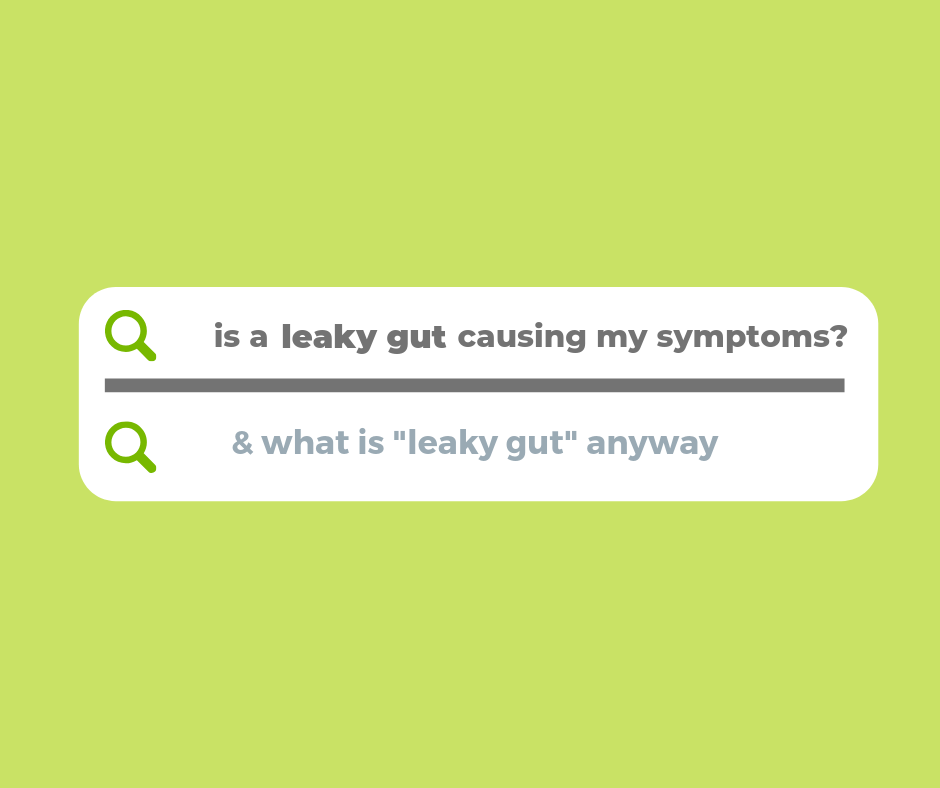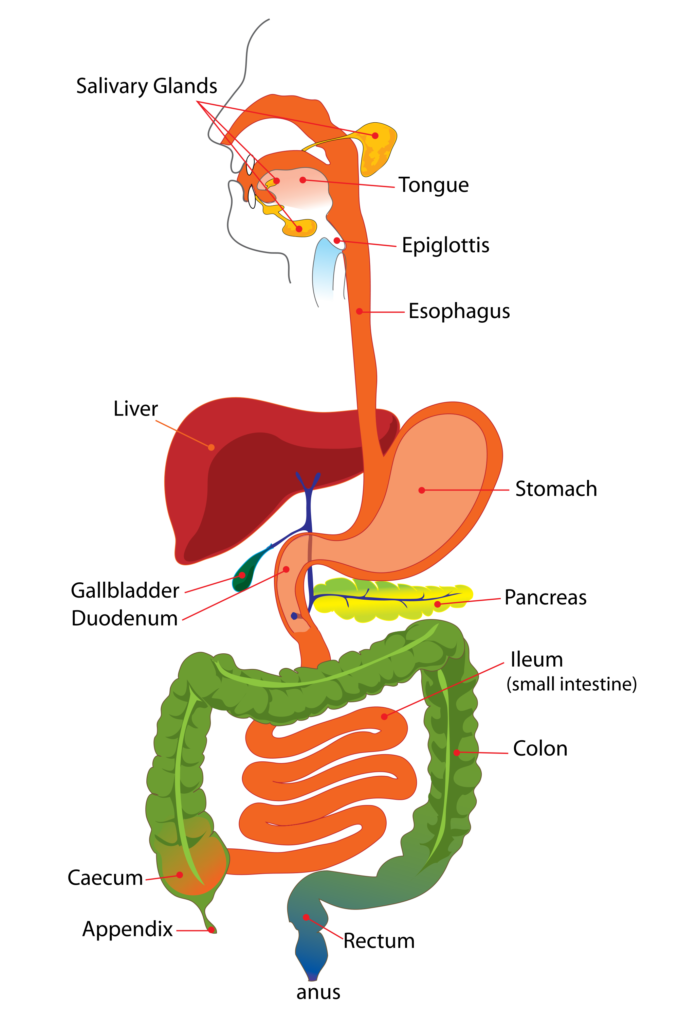Is a Leaky Gut Causing my symptoms?

Leaky gut may be causing your digestive issues among other health issues.
If you’ve read any headlines or social media posts about health & wellness in the past few years, you’ve probably come across the hot topic of gut health. And rightly so.

The health of one’s gut, or digestive system, and more specifically the stomach and small and large intestines, is of utmost importance to the health of the entire body. It’s the epicenter of food transformation. Food comes in through the mouth (where part of digestion actually takes place with chewing & action of the saliva) and then gets chemically broken down to eventually be absorbed into the “inside” of the body in the bloodstream, where the nutrients are delivered to all parts of the body.
And get this- the gut is really one large canal that starts in the mouth and esophagus and can technically be considered “outside” of the body. That’s because things that come in through the mouth do not go directly into the bloodstream, which is considered “inside”. Pretty interesting to think about it that way. What is the need for this preliminary period of food breakdown while remaining sort of “outside” the body?
Why does food need to be digested properly?
There’s a few reasons.
The food we eat needs to be broken down into tiny nutrients.
Food that you can see with your eyes- the large pieces on your dinner plate or even the creamy liquid in a smoothie- needs to get broken down into tiny, microscopic pieces in order to be used by the body. Think about the billions of cells in your body. They are so small! Nutrients need to be that small in order to used by the cells which are the ultimate destination for nutrient transformation. Just like the gut is the food transformation epicenter, cells are the nutrient transformation epicenters. Nutrients are the tiny pieces that make up food and are the fundamental nourishment for our bodies. Food needs to go from macro to micro in size.
Nutrients need to be recognizable.
The health of our immune system is intimately connected to what we eat. The immune system like a school. It is made up of “supervisors” that are constantly roaming the “halls” of the bloodstream. In a school, the school security & hall monitors scout the school hallways to make sure all things are safe, making sure that all of the students or staff present are properly identified and accounted for. If an intruder came through, the security staff would easily recognize the intruder based on their lack of proper identification or uniform.
But what if instead of being an intruder, the person was actually just a friendly parent innocently there to bring their child their lunch that they forgot at home. Sounds like no big deal. But if that parent had bypassed the check-in at the main office & gained access into the school, then they went against protocol. Protocols are meant to keep everyone safe. The security may recognize that parent (although truly innocent and having good intentions) as a potential threat because they do not have the proper identification.
The gut is like the school’s main office. The bloodstream is the school hallways, where you can access all parts of the school or the body. The classrooms are the students’ destinations and are like the cells of our bodies.
Things that come in through the mouth are mostly food. But also toxins, bacteria, & other substances make their way into out “gut canal” each day. Just think about using your hand to open a door and the next moment licking those same fingers after eating a delicious chicken wing. Gross, but we’ve probably all done it at least once.
Our body is exposed all day long to little benign intruders but also potentially threatening ones. We need to have a system that processes or excludes these from getting into the “inside” or bloodstream of our bodies. This is a huge part of what the gut does. Your gut works to absorb nutrients from foods while at the same time preventing absorption of intruder-like substances.
The food we eat is like that parent trying to gain access to the school to drop off their child’s lunch. The big pieces of food we eat need to gain access to the inside bloodstream of our body in order to drop off the tiny nutrients to our cells. However, the food needs to first become those tiny nutrients that are recognizable. It needs to be broken down & transformed properly before gaining access to our bloodstream, just like the parent needs to go to the school’s main office to get a visitor’s pass before entering the school.
Leaky Gut Can Actually Cause Food Sensitivities
Let’s use an egg as an example of “big food”. An egg can be a perfectly acceptable food that supplies healthy nutrients to our cells, just like the parent who has good intentions for gaining access to the school. However, an egg that is eaten and not properly broken down & transformed into tiny pieces before gaining access into the bloodstream can be seen by the immune system “hall monitors” as an intruder.
While in the context of the school, a security guard might confront the parent & then easily discern that the parent is not a threat. Therefore, security would not use any forceful measures on that parent, & perhaps even let the parent continue as desired.
But with the gut, the scenario is different. If the egg proteins leak through the gut lining into the bloodstream as big molecules rather tiny nutrients, they are going to be taken down with brute force by the immune system. The big egg proteins are recognized as “other” and therefore a threat. This can lead to a food sensitivity to that particular food. If the proteins had been properly broken down into tiny protein components called amino acids, the immune system would have recognized these, as if they had a “visitor’s pass”. While eggs have good nutritious potential, our immune system doesn’t take the time for a nice conversation to ask if the food has good intentions. Our immune system is kind of like the secret service level of security. It’s top notch and fierce.
So why might food pass into the bloodstream if it’s not in the proper form as “tiny nutrients”? This is where the term “Leaky Gut” comes into play.
What is Leaky Gut anyway?

Firstly, what is the gut? The gut is a big long canal lined with sturdy, tightly bound cells that only want to let the proper nutrients pass through its walls. It’s like a secure fortress.
When the cells lose their grip on the neighboring cells, the wall can become leaky. The gut, once a Marine corps-level fortress wall, is now a weather-beaten retaining wall that is allowing substances to pass through unintended.
Remember the egg. It is a big piece of food that has the potential to supply nourishment to the body but only if in the proper, usable form of tiny nutrients.
Leaky gut has even been identified as one of the three criteria needed for autoimmunity to occur.
What causes leaky gut?
Anything that disrupts the sturdiness of the gut lining makes it become leaky.
Inflammation
Inflammation is often the underlying cause of leaky gut. Many things that can cause dysfunction in the body actually carry out their dysfunction by contributing to inflammation. When this happens, inflammation then becomes the main super villain in the body and the driver of almost all chronic conditions.
And many lackluster eating patterns & lifestyle habits can contribute to inflammation, such as…
- Excessive amounts of sugar in the diet which directly causes inflammation and nutrient deficiencies.
- Ultra-processed foods and strange ingredients in processed foods
- Inflammatory fats without enough omega-3 fats, which increases inflammation and the risk for inflammatory conditions like obesity
- Deficiency of proper nutrients
- Lack of sleep
- Excessive and/or chronic stress
Imbalance or “dysbiosis” of your gut bacteria contributes to leaky gut.
Your microbiome is the “neighborhood” of bacteria that naturally resides in your gut. Since the bacteria work as a team in a synergistic relationship with your gut, they must be in proper balance to enable a healthy gut. If the natural balance of bacteria in the “neighborhood” gets thrown out of balance, the gut becomes irritated & dysfunctional.
Think about a neighborhood. It is a happy neighborhood when everyone helps each other out. But when something triggers discord, those neighbors may no longer help each other out. They lose touch. According to this 2016 article, the gut bacteria play a major role in the integrity of the gut lining, and imbalance can cause leaky gut leading to a host of autoimmune conditions. For the cells of the gut, the “discord” of bacteria causes the gut cells to lose their grip on their neighboring cells. This causes leaky gut syndrome.
Imbalance of bacteria which may include an overgrowth of harmful bacteria may itself cause more inflammation (this is like the gossip & animosity that spreads after the neighbors lose touch), yet another reason for leaky gut to occur.
Imbalance may occur due to:
- Unhealthy diet: eating too much sugar, excessive & refined carbohydrates, ultra-processed foods, lack of fiber, lack of phyto-nutrients (the healthy nutrients in plants, like antioxidants)
- Overuse of antibiotics and some other medications
- Stress & stressful, triggering events
- Lack of sleep
- Inflammation & immune activation (You can see then that inflammation, leaky gut, & gut bacteria dysbiosis can be a vicious cycle if we don’t stop the process with healthy diet & lifestyle changes).
There is a cascade of problems that stem from inflammation. An unhealthy diet can produce inflammation which causes leaky gut. When improperly digested foods leak into the bloodstream, the immune system attacks. Eating a poor diet over a prolonged period of time can cause immune dysfunction (getting sick more often, increased risk for immune-related disorders, etc). At the same time, bacteria in the gut is growing out of balance, causing more issues and more inflammation. And bacteria, good or bad, can also leak through the weakened gut lining causing more immune activation and attack.
What kinds of conditions may be caused by leaky gut?
Food Sensitivities
According to this 2019 review article, leaky gut causes immune activation which can trigger many many health conditions including food sensitivities. Recall the intruder or parent analogy at the school. If something gets into the bloodstream that isn’t supposed to be there or is present in an improper form, then the immune system attacks.
This means that leaky gut can actually be the “upstream” cause of the “downstream” effects like development of food sensitivities. Food that is good for you may end up becoming in a way “bad” for you because of the immune system activation that can occur with leaky gut.
I get this question all of the time:
Why are there increasing numbers of people who are sensitive to certain foods?
Leaky gut may be the answer. With a society overall burdened by an increase in processed ingredients in foods, less anti-inflammatory foods, more stress, less sleep, and increased use of medications over food & lifestyle remedies, is it any wonder that leaky gut is on the rise?
Fatigue
Since your body is working overtime & inflammation is likely causing a host of downstream effects, fatigue is your body saying, “Enough!”
Immune Conditions
Leaky gut often leads to gut-related disorders due to gut bacteria directly impacting the gut lining around them. Imbalance of gut bacteria and leaky gut can cause undesirable immune activation which can lead to many disorders outside of the digestive tract as well. There are many unfortunate effects of an overactive immune system:
- Autoimmune conditions like rheumatoid arthritis, multiple sclerosis, lupus, Hashimoto’s thyroiditis, etc.
- Inflammatory conditions & hormone imbalance
- For example, PCOS (polycystic ovarian syndrome) may even be a downstream effect of leaky gut. It could start with gut imbalance that leads to inflammation. Or it could start with an inflammatory diet in general, both leading to leaky gut which often causes more inflammation.
How to Heal from Leaky Gut
Address Food Sensitivities
Eliminate the foods to which you are sensitive. (I’ll call these “sensitive foods”). Remember- leaky gut might be causing you to be temporarily sensitive to a lot of foods. To stop the problem, you stop the leak. While improper diet might have been one of the first causes of leaky gut, the new sensitivities can cause immune activation & inflammation and may be perpetuating the leakiness of the gut. So we need to remove the sensitive foods and also eat foods that are nourishing & healing to the gut. After a period of elimination of sensitive foods & healing of the gut, many people can return to eating those healthy yet previously sensitive foods.
Navigating elimination of sensitive foods can be extremely tough to navigate on your own without a trained professional. I have expertise in food sensitivities and can definitely help you here!
Reduce Inflammation
Eat foods that are anti-inflammatory.
A lot of foods can help reduce inflammation. These include many vegetables, fruits, herbs, spices, fatty fish, olive oil, and more. Some foods are really potent in reducing inflammation. I call those the “heavy hitters”. These are foods and ingredients like turmeric, salmon, ginger, and blueberries. We want to eat an overall anti-inflammatory diet, which includes those generally anti-inflammatory foods but also some of those “heavy hitters”, those particularly potent anti-inflammatory foods. However, some anti-inflammatory foods may overlap with the sensitive foods. To navigate this tricky arena, work with a trained nutrition professional.
Eliminate inflammatory foods.
There is a lot to be said about which standard American foods are causing chronic inflammation. I’ll keep it brief for now, but stay tuned for more specific information to come. Reduce consumption of excess added sugar, excess refined carbohydrates, highly processed foods & junk ingredients, and unhealthy fats. Gluten and dairy may be problematic for some people as well.
Balance the Gut
You might have seen ads or headlines about probiotics, prebiotics, fiber for gut health, probiotic-supplemented health bars, etc. However, it’s not always so simple as increasing fiber or eating yogurt. There are many things that affect the health of the gut.
For example, there are tons of different types of fibers and many different strains of bacteria in yogurt & other probiotic foods. Each person’s gut may react differently depending on their unique “neighborhood” dynamic. And there are so many “health” products on the market that claim to be healthy for the gut. While some may be helpful, others may actually cause worsening of symptoms.
Again, the need for individualized & expert care from a trained nutrition professional is crucial.
Supplement Smartly
Nutrition supplements, when used safely and appropriately, can be an effective strategy complementary to dietary changes. Three important criteria I use when choosing supplements for my clients include efficacy, quality and dose. Personalized care from a nutrition or health professional trained in safe and effective supplement use is essential.

Bottom Line
Remember this. Leaky Gut is a syndrome. Its root causes are likely inflammation or imbalance of gut bacteria, both of which can be caused by improper diet & lifestyle. The good news? They can be addressed with proper diet and lifestyle.
Need Help with Leaky Gut or Inflammation?
First, consider this when making an informed decision:
- Not all dietitians, nutrition professionals, or doctors understand or accept the process of leaky gut.
- Working with a dietitian or healthcare practitioner who is trained in root-cause healing of gut health issues is essential. Leaky gut healing is multi-faceted from nutrition to lifestyle changes, so a practitioner must understand the need for a multi-faceted treatment plan.
- Some healthcare practitioners may practice with outdated nutritional guidelines that may be unsupportive for healing leaky gut. Working with a practitioner who understands the nuances of nutrition for gut healing and can help you identify what best fits you at different stages of healing is critical.
When it comes to leaky gut, the immune system, and food sensitivities, not all foods fit. Real, wholesome foods do fit. And even with real foods, food sensitivities need to be accounted for. This is why simply “clean eating” doesn’t always solve health issues. Food sensitivities or other individual needs have to be addressed.
If you suspect that your are having any symptoms or conditions described above, please consider working with a trained nutrition professional who is an expert in the area of gut health and inflammation and uses a real food approach.
If real food isn’t part of the approach, then the protocol isn’t worth your time. This is crucial and why I am so vocal about the need for integrity and commitment to truth of healthcare practitioners.
Work with Me
I specialize in gut health and inflammatory & immune conditions. I provide the real food approach & expertise that is essential for true healing.
Schedule a FREE discovery call to discuss your particular health needs and see how I can help you on your health journey.
BOOK YOUR FREE GUT HEALTH STRATEGY SESSION